AI+Science conference hosted by UChicago, Caltech gathers top experts
AI is already transforming a large portion of our lives. But when it comes to scientific discovery, it holds tremendous potential. Today, everything from new drug discoveries to AI-inspired neuroscience and climate modeling incorporates powerful machine learning systems—and many scientists think it’s just the beginning.
Researchers and industry experts believe artificial intelligence (AI) and machine learning will fundamentally change the nature and pace of scientific discovery. Widespread adoption of AI in the sciences has the potential to integrate scientific inquiry with hypothesis generation, data analysis, simulation, and testing that exceed our collective human abilities and that will transform our capacity to address scientific and societal problems that currently appear intractable. Facilitating this transformation are efforts to build bridges between academia, national labs, and industry.
These topics were covered at the recent University of Chicago and Caltech Conference on AI+Science, sponsored by the Margot and Tom Pritzker Foundation, examining how AI and machine learning are being developed and used for scientific discovery across the natural sciences and engineering.
The inaugural event was hosted March 28-30 at the University of Chicago, with the goal of bringing together dozens of leading researchers in core AI and domain sciences to lead conversations and drive partnerships that will shape future research priorities, industry investment and entrepreneurial opportunities. Over three days, participants joined 27 speakers and panelists for the event.
View the conference webpage for more information and resources and the event YouTube playlist to watch speaker videos.
Unlocking potential in an emerging field
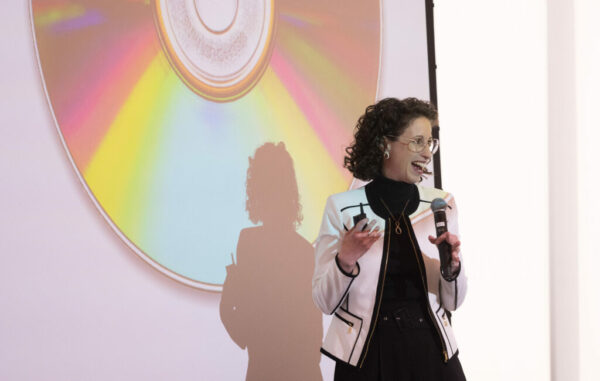
Recent advances in AI, including new models for generating images and text, have spurred the imagination of the scientific community. However, successfully accelerating scientific discovery using AI requires efforts that extend beyond applying off-the-shelf AI models to scientific data. Unlike generic text and images, scientific data is relatively expensive to gather and hence requires carefully designing experiments and learning limited quantities of data; scientific innovation often relies on understanding anomalous data rather than “typical” data represented by most AI models; and science seeks not only good predictions but also a fundamental understanding of underlying mechanisms. These challenges arise across physics, chemistry, biology, astronomy, earth sciences, and more.
Paul Alivisatos, president of the University of Chicago, told the audience during his welcome address that AI strategy in the US is now categorized into six broad approaches. These include AI-based surrogates for high-performance computing, robotics in autonomous discovery, programming and software engineering, control of complex systems, including chemical reactors, solving inverse design problems and creating new foundational models for science. This kind of AI-enabled scientific inquiry is still in its infancy but has the potential to accelerate the pace of scientific discovery in multiple fields while expanding the ability to explore across a variety of disciplines.
In many instances, scientists now have more data than they can effectively analyze, demonstrating the need to use predictive modeling and AI. “AI makes it possible to understand the science better,” says Michelle Hoffman, executive director of the Chicago Biomedical Consortium.
Learning from success stories
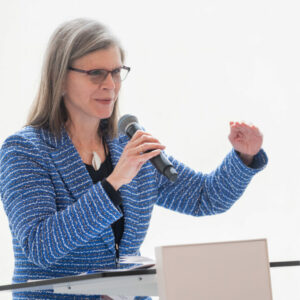
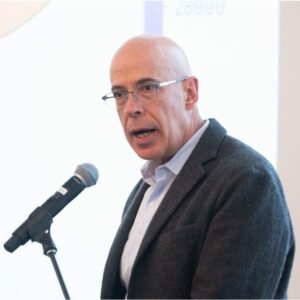
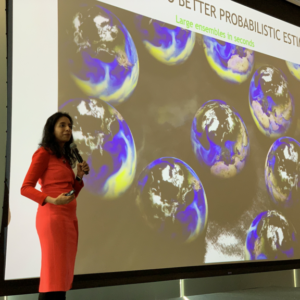
Deploying AI and machine learning capabilities have increased substantially in the last few years, and many speakers highlighted remarkable successes.
At the Memorial Sloan Kettering Cancer Center, for instance, computational chemist John Chodera and his team of scientists are working on building novel models that use and integrate aspects of AI at different levels of the drug discovery process.
Chodera is also the co-principal investigator of an antiviral drug discovery center called the Artificial Intelligence-driven Structure-enabled Antiviral Platform (ASAP), which delivers new drug candidates against a variety of viruses, including Covid-19.
“What we’re trying to do is to develop predictive models that will be useful to guide drug discovery,” he said. “We’d also like to enable people to make statistically sound decisions about drug discovery.”
In climate science, presenter Anima Anandkumar, the Bren Professor at Caltech and Senior Director of AI Research at NVIDIA, highlighted how AI helps speed up the search for new carbon capture and storage technologies, such as a multi-phase rail system that combines gas and water to mitigate climate change. The necessary simulations can be run orders of magnitude more quickly despite the complex process. “We are able to do that much faster, about 700,000 times faster, than the current numerical records,” she told the audience.
More importantly, many of the AI models – be it for climate change forecasting, drug discovery, or next-generation autonomous vehicles – need to evolve, by allowing users to continue gathering data through autonomous systems, added Anandkumar. “What we ultimately want, is models that continue to learn online,” she said. “You can’t just say, I’ve learned everything — that’s it, this is the best I can do.”
Eliminating barriers
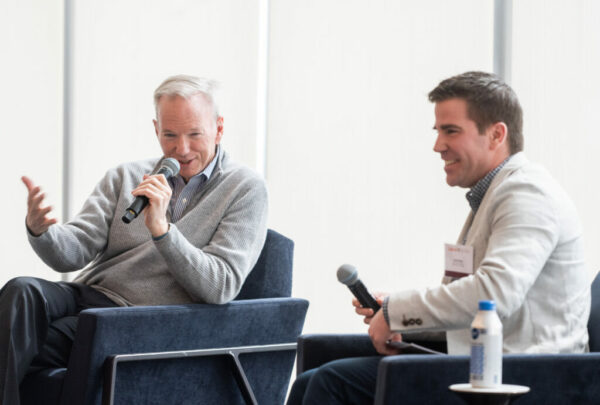
Whether using AI in drug discovery or other pressing problems, building bridges across the disciplines is essential.
Like at Sloan Kettering, integrating computer scientists involved in machine learning into the environments they serve makes it easier to demonstrate how their tools can usher in scientific breakthroughs, said Jai Das, cofounder of Sapphire Ventures, who was part of a panel on entrepreneurship and innovation. “Having a closer tie between people working in the sciences and people in computer science who might be working on AI is needed for some of these problems to be solved,” he said. “The computer science folks don’t always know what the real-life applications are for some of the stuff they are working on.”
Many of the newest discoveries will mean “uncovering new laws of nature, incorporating AI-guided scientific measurement, physics-informed machine learning, and advancing AI foundations,” explained Rebecca Willett, professor of statistics and computer science at the University of Chicago who leads the university’s AI for Science initiative.
Today, moving forward in developing AI capabilities means focusing on multidisciplinary scientific platforms that can bring together knowledge beyond a university or single company promoting much-needed investment and fair access, said Eric Schmidt, former CEO and Chairman of Google in a conversation with UChicago Associate Professor of Physics and Enrico Fermi Institute Fellow David Miller.
In the near term, it’s critical to build infrastructure that allows AI advancement and significant investment that goes beyond a single institution. “I think the ideal scenario is that there will be one or more platform facilities that are run by some sort of consortium, which you all would access,” Schmidt added.